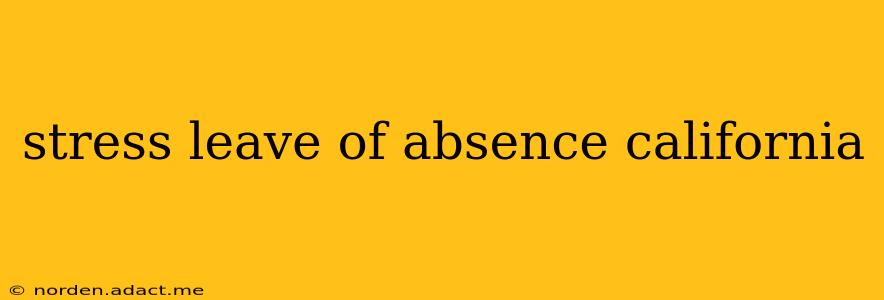Experiencing overwhelming stress can significantly impact your well-being and ability to perform your job. In California, employees have certain rights and options when dealing with stress-related issues that prevent them from working. While there isn't a specific "stress leave" category, several legal avenues can provide time off to address mental health concerns. This guide will clarify your options and the process involved in taking a leave of absence due to stress in California.
What is considered a legitimate reason for a stress leave in California?
A "legitimate reason" for a leave of absence due to stress in California hinges on whether the stress is impacting your ability to work and is related to a serious medical condition. This could stem from various sources, including workplace stress, personal life challenges, or a diagnosed mental health condition like anxiety or depression. The key is that the stress must be severe enough to prevent you from performing your job duties. Documentation from a healthcare professional is crucial in establishing this connection.
Can I take FMLA leave for stress in California?
The Family and Medical Leave Act (FMLA) applies to eligible employees who have worked for their employer for at least 12 months and at least 1,250 hours during the previous 12 months. FMLA covers serious health conditions that require treatment or continuing care. If your stress is related to a serious health condition diagnosed by a doctor, such as anxiety, depression, or post-traumatic stress disorder (PTSD), you may qualify for FMLA leave. The leave is unpaid, but it protects your job while you are away.
What about California Family Rights Act (CFRA) leave?
The California Family Rights Act (CFRA) is similar to FMLA but offers broader coverage. CFRA allows eligible employees to take job-protected, unpaid leave for their own serious health condition, including those related to stress. Eligibility requirements are generally the same as FMLA. Crucially, CFRA provides more generous leave provisions than FMLA, often offering a longer duration.
How do I request a stress leave of absence in California?
Requesting a leave of absence due to stress requires careful documentation. The first step is to consult with your healthcare provider and obtain a medical certification that explains your condition and the need for time off. This certification should clearly state your diagnosis, the impact on your ability to work, and the expected duration of the leave. You then submit a formal request to your employer, including the medical certification. Be prepared to discuss reasonable accommodations that might allow you to return to work gradually. It's beneficial to communicate with your HR department to understand their specific leave policies and procedures.
What are my rights regarding job security during a stress leave?
Both FMLA and CFRA provide significant job protection. Your employer is generally prohibited from retaliating against you for taking leave under these laws. This means they cannot demote, fire, or otherwise discriminate against you for taking medically necessary time off to address your stress. However, it’s vital to follow the proper procedures outlined by your employer and the relevant legislation.
Can my employer deny my request for a stress leave?
While employers cannot deny a leave request based on discrimination, they can deny a request if it doesn't meet the requirements of FMLA or CFRA. This might include insufficient medical documentation or failure to meet the eligibility criteria. If your request is denied, carefully review the reasons provided and consider consulting with an employment lawyer to explore your options.
What if my stress is caused by my job?
If your stress is directly caused by a hostile work environment, harassment, or unsafe working conditions, you may have legal recourse beyond FMLA or CFRA. You might be able to file a workers' compensation claim or a lawsuit against your employer for creating a harmful work environment. In such cases, seeking legal counsel is strongly recommended.
What happens after my stress leave?
Upon your return from leave, communicate with your employer regarding your readiness to resume your duties. Depending on the severity of your condition and any accommodations agreed upon, you might transition back to work gradually. Open communication with your employer and healthcare provider is key to a successful reintegration into the workplace.
This information is for general guidance only and does not constitute legal advice. If you are facing challenges related to stress and work, it's advisable to consult with a healthcare professional and an employment lawyer to understand your specific rights and options under California law.
